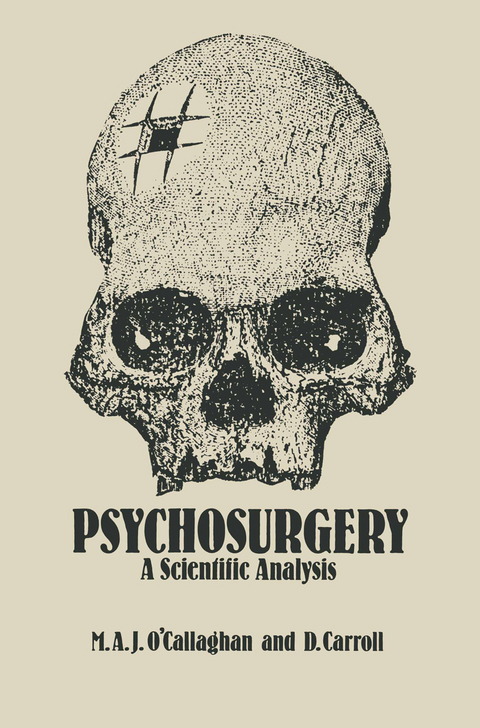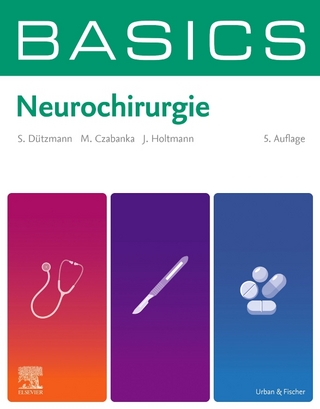
Psychosurgery
A Scientific Analysis
Seiten
2012
|
Softcover reprint of the original 1st ed. 1982
Springer (Verlag)
978-94-010-9705-5 (ISBN)
Springer (Verlag)
978-94-010-9705-5 (ISBN)
Of all the therapies that comprise psychiatric practice, the use of brain surgery to modify behaviour is the most contentious. In the United Kingdom the characteristically subdued tenor of the debate frequently obscures the popularity of the practice and the commitment of its opposition.
Of all the therapies that comprise psychiatric practice, the use of brain surgery to modify behaviour is the most contentious. That such behavioural neuro surgery, or psychosurgery, provokes opposition is far from surprising. The paramount status of the brain seems to belie mechanical intervention. The irreversible nature of the intervention seems to aggravate the outrage. Thus, opponents of the practice contend that psychosurgical procedures constitute a grievous assault on the integrity of the personality. Its proponents, on the other hand, confidently testify that it is a valid and efficacious form of treat ment for many seemingly intractable psychiatric disorders. Argument and counterargument have pursued the practice since its initial upsurge in the 1940s, although the decline in its popularity in the 1960s occasioned a tem porary cease-fire. However, the recent resurgence of psychosurgery has ensured that it is once again a matter of controversy. In the United Kingdom the characteristically subdued tenor of the debate frequently obscures the popularity of the practice and the commitment of its opposition. A recent application by the Royal College of Psychiatrists to the Medical Research Council for funds to mount a large controlled trial of psychosurgical procedures was turned down. Several opposition lobbyists might claim some credit for the proposal's lack of success. The Schizophrenia Association of Great Bri tain clearly and publicly expressed their disapproval of the trial. The Patient's Protection Law Committee presented Parliament with a petition condemning the Royal College's submission.
Of all the therapies that comprise psychiatric practice, the use of brain surgery to modify behaviour is the most contentious. That such behavioural neuro surgery, or psychosurgery, provokes opposition is far from surprising. The paramount status of the brain seems to belie mechanical intervention. The irreversible nature of the intervention seems to aggravate the outrage. Thus, opponents of the practice contend that psychosurgical procedures constitute a grievous assault on the integrity of the personality. Its proponents, on the other hand, confidently testify that it is a valid and efficacious form of treat ment for many seemingly intractable psychiatric disorders. Argument and counterargument have pursued the practice since its initial upsurge in the 1940s, although the decline in its popularity in the 1960s occasioned a tem porary cease-fire. However, the recent resurgence of psychosurgery has ensured that it is once again a matter of controversy. In the United Kingdom the characteristically subdued tenor of the debate frequently obscures the popularity of the practice and the commitment of its opposition. A recent application by the Royal College of Psychiatrists to the Medical Research Council for funds to mount a large controlled trial of psychosurgical procedures was turned down. Several opposition lobbyists might claim some credit for the proposal's lack of success. The Schizophrenia Association of Great Bri tain clearly and publicly expressed their disapproval of the trial. The Patient's Protection Law Committee presented Parliament with a petition condemning the Royal College's submission.
1 Historical introduction.- 2 Operative techniques.- 3 Quantitative evaluation of operative procedures.- 4 Patient populations undergoing psychosurgery.- 5 Adverse sequelae.- 6 Accuracy of operative techniques.- 7 Design and assessment of psychosurgical studies.- 8 Theoretical basis of psychosurgery.- 9 Ethical implications of psychosurgery.- 10 The regulation of psychosurgery.- 11 Sociopolitical aspects.- 12 Summary and conclusions.- Author index.
| Zusatzinfo | 332 p. |
|---|---|
| Verlagsort | Dordrecht |
| Sprache | englisch |
| Maße | 155 x 235 mm |
| Themenwelt | Sachbuch/Ratgeber ► Natur / Technik ► Garten |
| Medizinische Fachgebiete ► Chirurgie ► Neurochirurgie | |
| ISBN-10 | 94-010-9705-4 / 9401097054 |
| ISBN-13 | 978-94-010-9705-5 / 9789401097055 |
| Zustand | Neuware |
| Informationen gemäß Produktsicherheitsverordnung (GPSR) | |
| Haben Sie eine Frage zum Produkt? |
Mehr entdecken
aus dem Bereich
aus dem Bereich
Buch | Hardcover (2024)
De Gruyter (Verlag)
CHF 153,90
Buch | Hardcover (2023)
Springer (Verlag)
CHF 307,95


